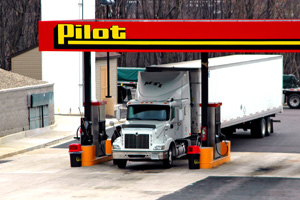FTC Sets Conditions for Pilot, Flying J Merger

The Federal Trade Commission has removed one of the last hurdles facing the proposed merger of Pilot Corp. and Flying J by ordering the two truck-stop chains to sell certain locations to rival rest stop operator Love’s Travel Stops and Country Stores.
The Federal Trade Commission on Wednesday said that it won’t clear the proposed merger until Pilot sells 26 truck stop locations to Love’s.
“The proposed settlement will resolve the competitive concerns resulting from Pilot’s acquisition of Flying J’s travel center business, which would have likely resulted in higher diesel fuel prices for long-haul trucking fleets,” Richard Feinstein, director of the FTC’s Bureau of Competition, said in a statement.
The public now has a 30-day window to post comments on the order. At the end of the comment period, the FTC will decide whether to finalize the order and officially clear the way for the proposed merger.
Most of the truck stops to be sold to Love’s are located in the Midwest and Eastern United States, according to the complaint the FTC filed in the matter of the Pilot/Flying J merger.
Pilot, Knoxville, Tenn., last year agreed to buy bankrupt Flying J’s truck stop business for about $1.8 billion. The deal does not include Flying J’s oil business, which will be sold separately. (Click here for previous story.)
In a statement Wednesday, Pilot and Flying J, Ogden, Utah, said that they had achieved “the completion of the merger of the two companies.”
“We are now one great company, two great brands,” said Jimmy Haslam, president and CEO of the combined company, which calls itself Pilot Flying J.
Crystal Call Maggelet, the granddaughter of Flying J founder Jim Call, said that “the merger is a historic moment in our industry.”
Pilot Flying J will operate more than 550 interstate travel centers in 43 U.S. states and six Canadian provinces, according to the company.




